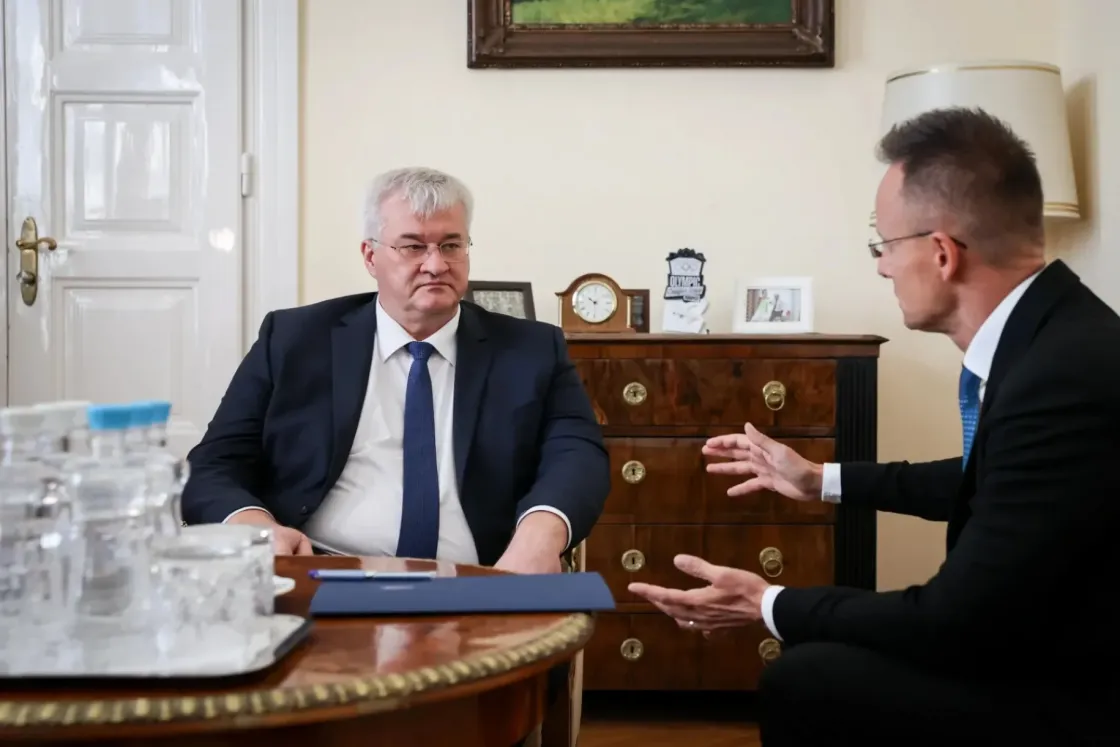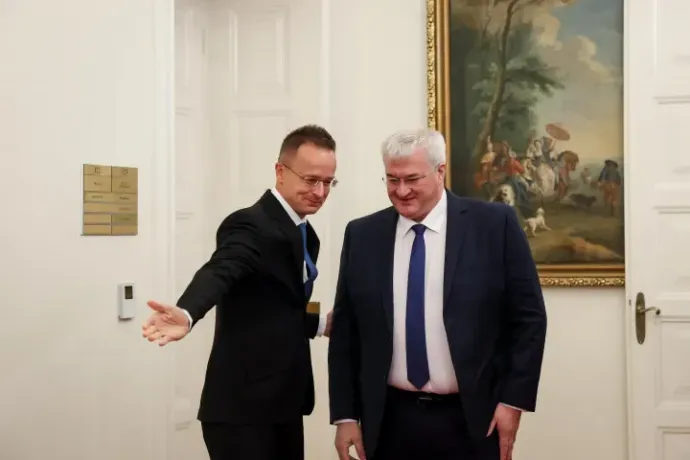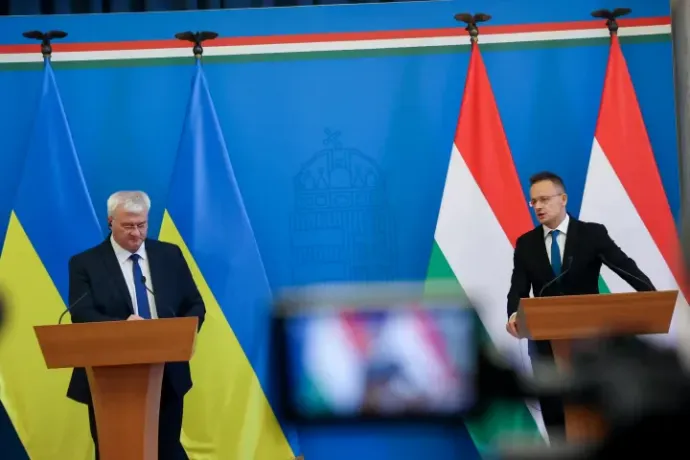Szijjártó to the new Ukrainian Foreign Minister: I cannot imagine how difficult it must be to be the foreign minister of a country at war

Barely four weeks after one of the biggest reshuffles of the Ukrainian government since the beginning of the war, the new Ukrainian Foreign Minister has already visited Budapest. Andrii Sybiha – who used to work in the president's office and then became deputy foreign minister to his predecessor, Dmytro Kuleba, before being appointed at the beginning of September – spent two hours in talks with his Hungarian counterpart Péter Szijjártó in Budapest on Monday.
After his meeting with the Minister for Foreign Affairs and Trade, they held a joint press conference at which they only gave brief outlines of their meeting, but questions from journalists were not allowed.
"Speaking from personal experience, I can tell you that being a foreign minister is not easy, but I cannot imagine how difficult it must be to be the foreign minister of a country at war", Péter Szijjártó began his speech with great empathy, wishing "much strength, perseverance and persistence" to Sybiha “for the successful completion of this demanding task.”
Szijjártó especially thanked his guest for choosing Hungary for his first trip abroad, other than his trip to New York for the UN General Assembly last week where they were both present. The minister stressed that “Hungary continues to take a pro-peace stance in relation to the Russian-Ukrainian war.”
"In the war that has been raging for almost a thousand days, Hungary is looking for the shortest path to peace", so that "the suffering of millions of people and families" can come to an end as soon as possible. Hungary supports any initiative "which includes the possibility of achieving peace as soon as possible", so that the war can be brought to an end “as soon as possible through negotiations and diplomacy.”
Beyond the term "Russian-Ukrainian war", Szijjártó did not mention Russia once, nor did he state that Ukraine is involved in the war as a victim of Russian aggression.
Szijjártó spoke of big numbers
The Foreign Minister mentioned that Hungary would continue the "largest humanitarian effort in its history" for as long as it was needed. He did not mention that the government had just recently limited this assistance to Ukrainian refugees by way of a government decree, geographically excluding people coming from several areas of Ukraine that the government does not consider a war zone, which makes those from these territories automatically non-eligible for aid. Although, it should be stated that most of those affected by this (but not all) are dual Hungarian-Ukrainian citizens from Transcarpathia, typically Roma.
"1,4 million Ukrainians have arrived in Hungary fleeing the war," Szijjártó said, without mentioning that the vast majority of them are not actually in the country, so it is not known how many stayed and how many are receiving state assistance as refugees. He said that 14,855 Ukrainian children received assistance for attending summer camps and that "Hungary has allocated 66 billion forints from the budget to finance aid to Ukraine." He also spoke about kindergartens and schools that have taken in Ukrainian children, as well as the first bilingual Ukrainian-Hungarian school.

Hungary is ready to participate in the reconstruction of Ukraine
Although Hungarian-Ukrainian relations are at a very low point, Szijjártó said that Hungary is "ready to participate in the reconstruction of Ukraine", and this is already underway. In addition, Hungary is "continuing to maintain the energy transmission capacities necessary for securing Ukraine's energy supply", so that electricity and natural gas can freely flow to Ukraine.
Although, as previously reported, this is done on a commercial basis: In the past two and a half years, 3 billion cubic metres of natural gas have been exported from Hungary to Ukraine, and "since June, Hungary has been the biggest source of electricity imports for Ukraine." This represents 45 percent of the country's imports, which entered Ukraine "from Hungary or via Hungary".
Szijjártó then spoke about developing border crossing capacities, and finally touched on the protection of the ethnic rights of the Hungarian minority in Transcarpathia, which is essential for turning constructive relations into good neighbourly relations. "There should be no negative discrimination against Hungarian-owned companies," he said.
Sybiha thanked Hungary for its help
Sybiha made his speech in a similarly friendly spirit. The Ukrainian Foreign Minister thanked Hungary for nearly everything: "We are grateful for Hungary's support of our sovereignty and for its approval of the 14 sanctions packages. We are grateful for the help Hungary has been giving us, we will never forget it. We thank Hungary for its participation in the reconstruction of Ukraine, in the de-mining of Ukraine." We consider all this as well as the opening of the first Ukrainian-Hungarian bilingual school in Budapest as the realization of the agreements between Volodymyr “Zelensky and Viktor Orbán.”
Sybiha repeatedly mentioned that Ukraine's goal is NATO and EU membership, neither of which was touched upon by Szijjártó in his speech. In this context, the friendly remarks were somewhat juxtaposed narratives, but it could also be understood as a tentative attempt to improve relations between the two countries.
"We will do our utmost to achieve peace, and we thank Hungary for supporting Ukraine's territorial integrity in the face of Russian aggression," said Sybiha. He thanked Hungary for its support for Ukraine's EU integration, although this is precisely the area where the Hungarian government's communication has been inconsistent.
Sybiha stated that "Ukraine has committed itself to guaranteeing the rights of the Hungarian minority". This is important because members of the Hungarian minority are also “defending Ukraine with a gun in their hand. This is proof that the Hungarian minority is our strength.”
The previous meeting was between Szijjártó and Sybiha's predecessor
The last time Szijjártó met the incumbent Ukrainian Foreign Minister – at the time Dmytro Kuleba – was in January this year in Uzhhorod. Although the meeting did not result in a spectacular turning point in the strained Hungarian-Ukrainian relations, Szijjártó did say that the Hungarian government stands by Ukraine's sovereignty and territorial integrity.
Hungary has criticised Kyiv for failing to guarantee the rights of the minority in Transcarpathia properly, while Kyiv sees the Hungarian government as making it harder to defend itself against Russia's attack by slowing down the approval of EU assistance and opposing the delivery of Western arms supplies, as well as objecting to sanctions against Russia. This is indeed in line with Russian interests, because it may indicate that there is not complete unity within the EU and NATO regarding the war against Ukraine.
However, in an interview with Telex in January, Dmytro Kuleba said that he believes the Hungarian Prime Minister is not pro-Russian – although Viktor Orbán has been accused of this from within the EU – but is rather a pro-Hungarian politician. Orbán brusquely rejected the conciliatory remark, saying that "we don't need the Ukrainian stamp of approval". Russian President Vladimir Putin had previously said that he did not believe the Hungarian government could be accused of being pro-Russian, but that it was merely pursuing Hungarian interests. Unlike Kyiv's remark, Orbán did not reject this statement.
Orbán also did not make any comment when – after taking over the rotating presidency of the EU Council – he travelled first to Kyiv and then unexpectedly to Moscow. There, at a joint press conference with Putin, Orbán did not correct the Russian President when he claimed that the Hungarian Prime Minister had gone to Moscow among other things, as a representative of the EU. Later on, Minister at the Prime Minister's Office Gergely Gulyás claimed that not making a clarification on something in such a situation was common courtesy in diplomacy.

Orbán has been widely criticised by the EU for his unexpected visit to Russia, which he described as a peace mission. During the recent UN General Assembly, it was announced that the Chinese-Brazilian Friends of Peace platform, led by China, had also been set up on the basis of a Hungarian idea.
However, it is still unclear under what conditions the Hungarian government, which has been advocating for a ceasefire, envisages a cessation of the fighting, given that the Russian side has not come up with a substantive proposal. In fact, Russian Foreign Minister Sergey Lavrov had previously said that, even if they were to negotiate, they would not stop fighting until the provinces of Donetsk, Luhansk, Zaporizhzhya and Kherson (including parts that Russia hasn't been able to capture in its war against Ukraine for the past 31 months) are annexed to Russia similarly to Crimea.
Despite sometimes admitting that Ukraine's self-defence is legitimate, the Hungarian government's attitude to Ukraine's defence is clearly negative. This attitude has become especially apparent since the statement made by the Prime Minister's political director, which has attracted a great deal of international attention. Although Balázs Orbán did apologise for drawing a parallel with Hungary's 1956 revolution, he only did so after Viktor Orbán described his statement – which criticized Ukraine for defending itself – as a mistake. Exactly what he meant with his ambiguous historical parallel remains unclear – even after we asked him to clarify when we caught up with him in front of his home on Monday morning.
For more quick, accurate and impartial news from and about Hungary, subscribe to the Telex English newsletter!